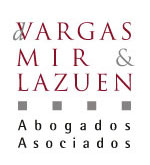

“We are an office of medium-sized by vocation and by choice.”
The cabinet “De Vargas Mir et Lazuen” has a long story for a multidisciplinary office and this experience allows us to approach of a modern and effective form the cases which we are in charge of. We are a cabinet of medium-sized by vocation and by choice. We take care of various concrete domains of the right in which we are specialized. We pay attention on the interests of our customers and give a very personalized treatment in the cases which they confide us.

José Manuel
De Vargas Lozoya
Founder
Master’s degree in Law from the Central University of Barcelona (1971).
—
Graduate of Higher Studies of Comparative Law from the International Faculty of Comparative Law of the University of Strasbourg (France).
—
Master’s degree in Economy from the Center of International Studies of the Chamber of Commerce of Barcelona.
—
Graduate in Financial Management from the School of the Senior Management and Business Administration of Barcelona (EADA).
—
Studies of the third cycle in Universities of France and Italy.
—
Full professor of Constitutional Law of The Central University of Barcelona.
—
Languages: Castilian, Catalan, French, English and Italian.

Josep María
Mir Padullés
Associate Member
Master’s degree in Law from the Central University of Barcelona (1982).
—
Specialist in Procedural Law.
—
Criminal Law.
—
Condominiums, Leases.
—
Successions.
—
Real state Law and Construction Law.
—
Family Law, Divorce and Separation.
—
Commerce Law, Claims of Consumers Law.
—
Sport Law.
—
Languages: Castilian, Catalan, French.

Jesús
Lazúen Alcón
Associate Member
Master’s degree in Law from the University of Granada (1976).
—
Professor of Tax Law of the master’s degree in Law from the Higher Institute of Law and Economics (ISDE) (1998-1999).
—
Associate professor to the chair of Financial and Tax Law at the Autonomous University of Barcelona (1989-1993).
—
Specialized in Tax and Company Law.
—
Languages: Castilian, Catalan, French, English.

Carlos Javier
Aparicio Jimenez
Lawyer
Master’s degree in Law from the University of Deusto (Bilbao).
—
Studies specialized in General Economics and Business Administration.
—
Specialized in Commercial and Tax Law, financial and accounting analysis.
—
Specialized in Corporate Restructuring.
FAMILY LAW
ESTATES AND INHERITANCES
LEASES AND HORIZONTAL PROPERTY
REAL ESTATE AND CONSTRUCTION
BANKRUPTCY, LEGAL REDRESS/RECEIVERSHIP
COMMERCIAL CONTRACTS
PROCEDURE OF TAX MANAGEMENT
PROCEDURE OF TAX INSPECTION
PROCEDURE OF AUDIT
INTERNATIONAL TAXATION
Our office also invoices, when applicable, the cost of any advanced payments that it may undertake on behalf of its clients (bailiffs’ fees, registrars, hearing fees, etc…) in addition to the fixed fees.
As far as these expenses (that are qualified as legal costs) are concerned, they are generally uncured to the party which loses the case in order that they can be invoiced to the adversary and not to the client. The customer can recover these expenses from the adversary or directly from the Court.
In the event of appeal, the costs incurred by first instance proceedings are invoiced to the client who will recover them, in that event, from the adversary if they are incurred upon him by the Appeals’ Court.
The remuneration of a lawyer is determined taking into account the following elements:
The firm invoices its fees on the basis of time spent on a case which, if required, are adjusted upwards or downwards according to the rules indicated above in addition to an adjustment according to the results obtained, always in accordance with the previous agreement.
Fees based on the time spent
The lawyers’ hourly fees are as follows: 220 € HT. All the time passed on a case is invoiced on this basis, this includes travel time and waiting time at audiences and time passed on the telephone.
Contingency fees
When the outcome of an intervention by a Lawyer leads to a quantifiable result, a contingency fee is invoiced in addition to fees for the time passed on a case.
A fees agreement may be signed between the client and the Lawyer in which it is specified if a contingency fee has been agreed upon or not, along with the procedure defining the valuation of this complementary fee, if applicable.
One or more complementary retainers may be demanded as a case advances according to fees, expenses and other costs engaged.
At the end of a case, a final invoice is established to complete the dossier. This includes, if applicable, a contingency fee for results obtained and also takes into account the retainers already paid, which will be deducted and appear in this invoice.
Once a dossier has been opened, or during the course of proceedings, a fee agreement may be determined which defines in advance the tariffs to be applied according to interventions carried out by the practice.
For certain types of dossier, a fee agreement can be determined (especially in the case of regular advisory meetings) which can be assimilated to a form of subscription.
© 2025 · De Vargas, Mir & Lazuen | Aviso Legal
Designed by DeVARGAS STUDIO